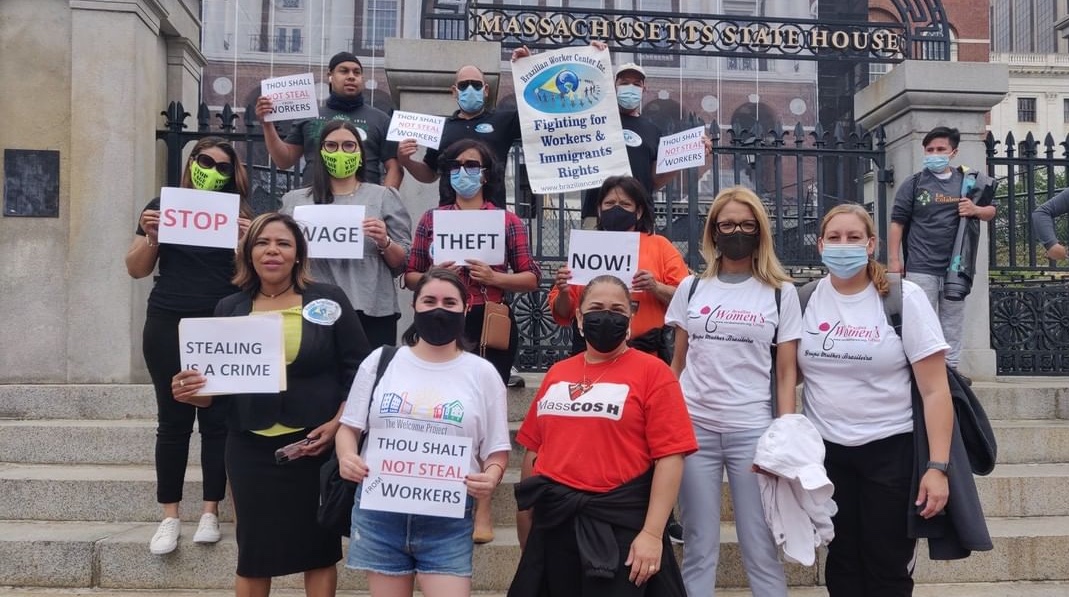How can we continue to combat this persistent problem?
(Somerville Wire) – The problem of wage theft in Somerville has persisted long enough that in late 2019, the City Council passed a new Wage Theft Ordinance. This law also created a Wage Theft Advisory Board, a group that has given workers hope but that could also use more resources, according to Somerville Worker Center’s worker rights organizer and board member Francisca Sepulveda. In Somerville, she said, the industries that most commonly experience wage theft are construction, laundry, and domestic businesses.
“The most common form of wage theft is not paying [workers’] salary,” said Sepulveda. “… But another form of wage theft [that happens] … is not giving meal breaks. We have heard of a lot of workers who are not allowed to take a meal break during the work shift. What some companies will make them do is, [say], okay, it’s time for lunch. … Clock out, like you are going to lunch. But instead of going to lunch, keep working.” She added, “That’s one way. Another way is when a worker has to stay and do overtime, and they do not get their overtime paid. [Or] whenever they need to have sick leave, and the employer either does not allow them to accumulate their sick time or they just don’t let them take their sick leave. That’s another form of wage theft.”
Sepulveda described other ways a worker may experience wage theft: for example, through misclassification, an individual might not be considered an employee but would be called an independent contractor. In this way, they would lose benefits that could have been valuable to them. Another problem is when some workers, called “day laborers,” work as temporary workers at a site and never receive their payment. She said that she has heard of companies that would be closed for committing a form of wage theft but would then reopen, with a different name. In some cases, a painter might go to a job site and be provided with tools or personal protective equipment, the cost of which could be deducted from their paycheck. Sepulveda said she has also seen the price of uniforms for a domestic worker come out of the worker’s paycheck.
Milagros Barreto, worker center director at Massachusetts Coalition for Occupational Safety and Health, said that many big developers in Somerville hire low-wage workers, who may or may not be undocumented immigrants. Frequently, the workers who come to MassCOSH for help have anxieties about disclosing their circumstances, because they fear they may be deported or reported to the Immigration and Customs Enforcement agency. Typically, there is a process for supporting workers being exploited by their employer. First, workers go through a wage theft clinic where they learn about how to exercise their rights. “The rights are not going to come to you. You have to go after the rights,” said Barreto. Second, MassCOSH asks if there are coworkers experiencing the same problem. If there are others, they hold a second clinic and also go forward with trying to collect evidence about the situation. However, said Barreto, it is hard to ensure that everything will go smoothly.
“I can never say nothing is going to happen,” said Barreto. She added, “We can’t guarantee that the employer is not going to fire them, and we can’t guarantee [that there won’t be] any retaliation. We are very clear with the workers. There is a possibility that this could happen. But if an employer retaliates against you because he knows you are trying to exercise your rights, you are protected by the law.”
Lenita Reason, executive director of the Brazilian Worker Center, acknowledged that the relatively new Wage Theft Ordinance, which went into effect in 2020, has been encouraging. If a contractor is to deny a worker his or her wages, they could have their permits pulled or refused. Teaching workers about their rights is also essential.
“I think one piece is education. For the past few years, we’ve tried to educate the workers about their rights. But because of the [change in climate], and people are still coming, you always have someone new who doesn’t know where to go,” said Reason. “… Even when you educate them about labor laws … they’re still afraid to speak up. The other piece is … making sure the law that exists is enforced. If you don’t enforce the law, you don’t send a message to the employer that they must stop [stealing] from the workers. … Somerville has an ordinance, so you can have more tools [so that] you can fight against the employers.”
Somerville’s Wage Theft Advisory Board is still trying to organize itself, said Sepulveda, but she believes it has a lot of potential.
“The ordinance sets a very open base on how to do and run things in the committee,” said Sepulveda. “We’ve had several times where we did not keep quorum, so we haven’t had as many meetings as we wanted to and hoped for. … We established a relationship with the Attorney General’s Office. One of the things that we’re starting to do is to analyze the Attorney General’s Office’s database, a wage theft complaint database. They have a spreadsheet that they update every two or three months [or so]—pretty often. … We get a sense of what are the companies that are getting more complaints against them. We’re working on workers’ rights education classes and campaigns. We’ve been working on the strategy of the committee, so we’re hoping to start doing activities like these.”
Board member Myrna Morales, who is also the director of the Massachusetts Coalition of Domestic Workers, said that she would like to see the Wage Theft Advisory Board grow into itself.
“I do see a lot of potential and a lot of hope,” said Morales. “The real issue is, are we going to put enough resources behind it to give it the fighting chance that it needs?”
This article is syndicated by the Somerville Wire municipal news service of the Somerville News Garden project of the Boston Institute for Nonprofit Journalism.
All Somerville Wire articles may be republished by community news outlets free of charge with permission and by larger commercial news outlets for a fee. Republication requests and all other inquiries should be directed to somervillewire@binjonline.org. Somerville Wire articles are also syndicated by BINJ’s MassWire state news service at masswire.news.
SUBSCRIBE TO THE FREE SOMERVILLE WIRE EMAIL NEWSLETTER: https://eepurl.com/hpBYPv
Check out all our social media here: https://linktr.ee/SomervilleWire.
Shira Laucharoen is assistant director of the Boston Institute for Nonprofit Journalism and assistant editor and staff reporter of the Somerville Wire.





